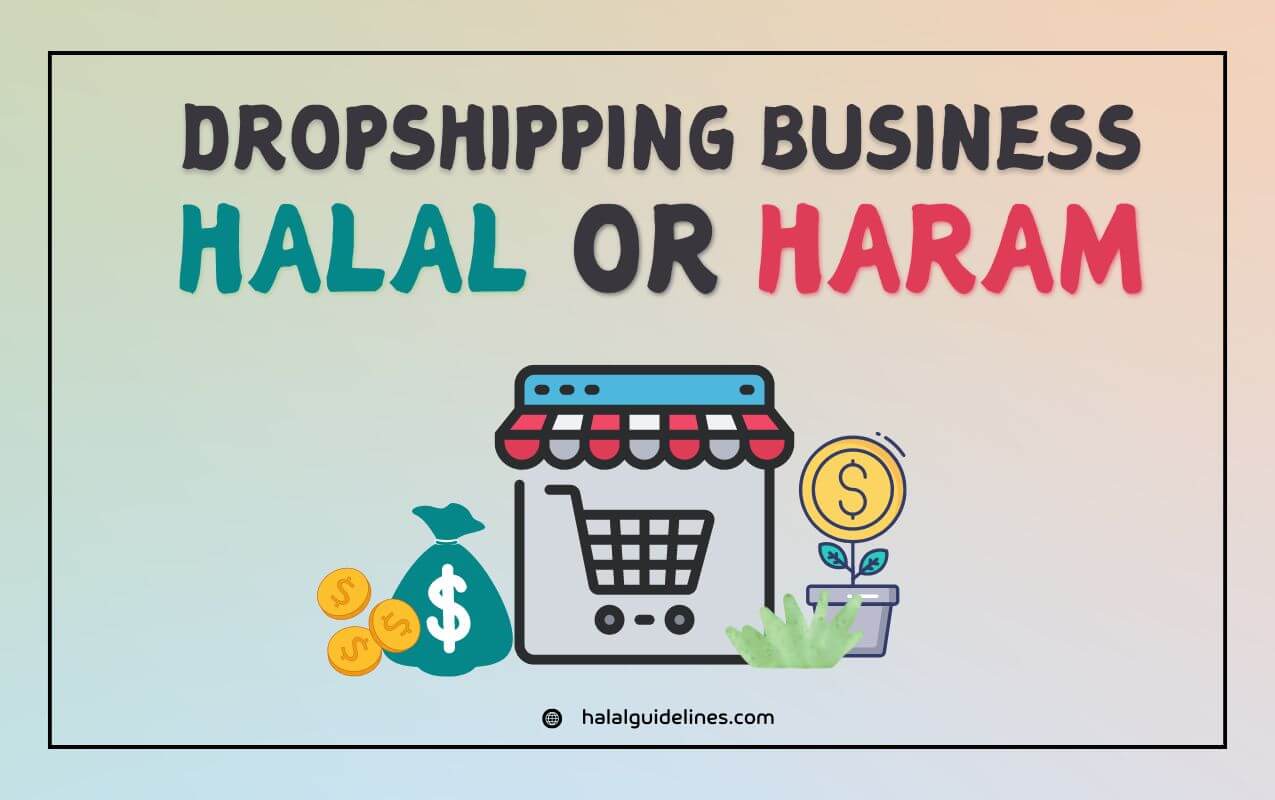For example, dropshippers might sell products they don’t own or haven’t seen, which can lead to issues with quality control and customer satisfaction. It may also involve misleading customers about shipping times or product origins.
But, it’s important to note that dropshipping can be made halal (permissible) by following certain practices and rules. These specific guidelines that can make dropshipping acceptable in Islam will be discussed in detail below.
Facts That Make Dropshipping Haram in Islamic Law

Before we explore how to make dropshipping halal, it’s crucial to understand the factors why dropshipping is considered haram (forbidden) in Islam. We can better address these issues and find permissible business methods by recognizing them.
Here are the key facts that make dropshipping problematic from an Islamic perspective:
1. Not Owning the Products:
In dropshipping, you often sell things you don’t actually have. Islam says you should own something before you sell it. It’s like promising to sell your friend’s bike without asking them first.
2. Too Much Guessing:
When you dropship, there is a lot of guessing involved. You can’t always know when the item will arrive or if it will be of good quality. This uncertainty can upset customers.
In Islam, business deals with too many unknowns are discouraged because they can be unfair and lead to problems. It’s important to make sure your business is clear and reliable to follow Islamic principles.
3. Tricking Customers:
Some dropshippers use fake pictures or claim their products are better than they really are, which can mislead customers. Islam teaches that we must always be honest and truthful when selling things. Being truthful ensures fairness and builds trust with customers.
4. Not Taking Responsibility:
If something goes wrong with an order, some dropshippers just blame the supplier. In Islam tells us that if you sell something, you should take care of problems.
5. Hidden Costs:
Dropshippers don’t tell customers about all the costs upfront. They might charge too much for shipping without saying why. Islam says we should be clear about prices.
6. Products Islam Doesn’t Allow Us to Sell:
When running a business, it’s important to make sure the products you sell follow Islamic rules. Without checking carefully, you might accidentally sell items that Islam forbids.
These include the products below which are:
- Alcohol
- Pork and Pork products
- Non-halal meat
- Drugs and intoxicants
- Gambling items
- Non-Islamic religious symbols
- Gelatin from non-halal sources
- Items for inappropriate activities
It’s important to make sure your inventory follows Islamic principles to keep your customers’ trust and satisfaction.
7. Not Being Honest About Shipping:
Dropshippers often don’t tell customers that their orders might take a long time to arrive or come from far away. Islam teaches us to be honest about these things. It’s important to let customers know if there might be delays or long shipping times so they know what to expect and can make informed choices.
By understanding these problems, we can start to think about how to do dropshipping in a way that follows Islamic rules. It’s important to know what’s wrong before we can make it right.
Steps to Make Dropshipping Halal in Islamic Ways

After discussing above which facts make dropshipping haram, now let’s discuss how to do dropshipping in a halal way.
Here are steps to make dropshipping more in line with Islamic principles:
1. Use a Pre-order Model:
Instead of selling items you don’t have, clearly advertise products as pre-orders. This way, customers know you’ll order the item after they pay. This addresses the issue of selling what you don’t own.
2. Partner Directly with Manufacturers:
Establish direct relationships with product makers. This gives you more control over quality and allows you to have accurate product information, reducing uncertainty (gharar).
3. Implement a Quality Control System:
Set up a process where you or a trusted partner inspects products before they’re shipped to customers. This might mean having some inventory or working with local inspection services.
You can also read this article below:
4. Create a Transparent Supply Chain:
Clearly show customers where products come from and how they’re delivered. Use real-time tracking and provide honest delivery estimates.
5. Develop a Shariah-compliant contract:
Work with an Islamic finance expert to create a contract that clearly outlines the roles and responsibilities of all parties involved you, the supplier, and the customer.
6. Establish an Islamic Customer Service Policy:
Develop a customer service approach that prioritizes Islamic values like honesty and fairness. This could include a no-questions-asked return policy and proactive communication about delays or issues.
7. Create an Ethical Product Vetting Process:
Develop a strict system for vetting products to ensure they’re halal and ethically sourced. This could include checking for prohibited ingredients and ensuring fair labor practices.
These steps go beyond simply avoiding haram practices and offer a proactive approach to aligning dropshipping with Islamic principles. They require more effort but can lead to a more ethical and potentially halal business model.
Quran and Prophet (S.A.W) Remarks on Business like Dropshipping
The Quran and the teachings of Prophet Muhammad (S.A.W) give us important rules for doing business fairly. While they don’t talk about dropshipping directly (because it didn’t exist back then), they do talk about honest trading.
Let’s look at some of these teachings:
1. Being Honest in Business
In Islam, honesty in business is not just encouraged it’s required. The Quran is clear about the importance of fair dealings:
یَـٰۤأَیُّهَا ٱلَّذِینَ ءَامَنُوا۟ لَا تَأۡكُلُوۤا۟ أَمۡوَ ٰلَكُم بَیۡنَكُم بِٱلۡبَـٰطِلِ إِلَّاۤ أَن تَكُونَ تِجَـٰرَةً عَن تَرَاضࣲ مِّنكُمۡۚ وَلَا تَقۡتُلُوۤا۟ أَنفُسَكُمۡۚ إِنَّ ٱللَّهَ كَانَ بِكُمۡ رَحِیمࣰا
Meaning: O you who have believed, do not consume one another’s wealth unjustly but only [in lawful] business by mutual consent. And do not kill yourselves [or one another]. Indeed, Allah is to you ever Merciful.
Reference: Surah An-Nisa Ayat 29 (4:29)

This verse reminds us to avoid unfair business practices. For dropshippers, this means being truthful about products, prices, and shipping times.
2. Selling What You Own
Islam teaches us to be careful about what we sell. In this Hadith, Hakeem ibn Hizaam asked Our Prophet Hazrat Muhammad (S.AW) :
“Messenger of Allah, a man comes to me and wants me to sell him something which is not in my possession. Should I buy it for him from the market?”
And Prophet (S.A.W) reply was:
لَا تَبِعْ مَا لَيْسَ عِنْدَكَ
Meaning: “Do not sell what is not with you”
Reference : Sunan Abi Dawud 3503

This hadith suggests we shouldn’t sell things we don’t possess. Dropshippers can apply this by clearly stating when items are pre-orders or ensuring they have the right to sell the supplier’s products.
3. Clear Terms in Advance Payments
The Prophet came to Medina and the people used to pay in advance the price of dates to be delivered within two or three years.
He said to them:
“ مَنْ أَسْلَفَ فِي شَىْءٍ فَفِي كَيْلٍ مَعْلُومٍ وَوَزْنٍ مَعْلُومٍ، إِلَى أَجَلٍ مَعْلُومٍ ”
Meaning: “Whoever pays in advance the price of a thing to be delivered later should pay it for a specified measure at specified weight for a specified period.”
Reference: Sahih al-Bukhari 2240

This hadith teaches us the importance of clear terms in transactions where payment is made before delivery. This means being specific about product details, quantity, and delivery timeframes when taking pre-orders.
These teachings provide a framework for ethical business practices, including modern methods like dropshipping. While they don’t give specific rules for dropshipping, they offer general principles to guide how we conduct business in a way that aligns with Islamic values.
Islamic Scholar Stance on Dropshipping
When it comes to new business practices like dropshipping, Islamic scholars play a crucial role in guiding Muslims on what is acceptable according to Islamic law. Their opinions can help Muslims manage the challenges of today’s business world while staying true to their faith.
In this halal method of Bai’ Al-Salam, the seller must:
- Clearly state that they don’t own the goods.
- Provide full details of the product, including weight, measure, and delivery date.
- Take full payment upfront.
- Be responsible for any delivery issues.
To meet the requirement of possession, the seller can hire a courier company as an agent to pick up the goods from the manufacturer and deliver them to the customer. This way, dropshipping can comply with Islamic rules.
Halal Business Ideas That are Alternatives to Dropshipping

If you’re hesitant about dropshipping or if your faith makes you uncomfortable with its practices, don’t worry. There are several business opportunities that align perfectly with Islamic principles. These alternatives can offer you peace of mind while still allowing you to become an entrepreneur.
Here are some 100% halal business ideas you can consider:
1. Halal Food Business:
Starting a halal food business is an excellent way to serve your community while bonding with our Islamic principles. This could take various forms:
- A catering service specializing in halal meals for events and gatherings
- A food truck offering halal street food
- A small restaurant or café serving halal dishes
You’ll need to ensure all ingredients are halal and that food preparation follows Islamic guidelines. This business allows you to provide a valuable service to Muslims looking for trustworthy halal food options.
2. Islamic Education Services:
With the growing demand for Islamic education, starting an educational service can be both rewarding and profitable. You could:
- Offer Quran classes for children and adults
- Provide Arabic language tutoring
- Teach Islamic studies courses
These services can be offered online, allowing you to reach a global audience, or in person if you prefer a local focus. This business not only generates income but also contributes to spreading knowledge about Islam.
3. Modest Fashion Design:
The modest fashion industry is booming, making it an excellent opportunity for Muslim entrepreneurs. You could:
- Design and sell clothing that points to our Islamic principles of modesty
- Create fashionable hijabs and accessories
- Offer custom tailoring services for modest wear
This business allows you to express creativity while serving the needs of Muslims who want to dress modestly yet stylishly.
4. Halal Travel Agency:
As more Muslims seek travel options that accommodate their faith, a halal travel agency could be a promising business. You could:
- Organize and offer travel packages catering to Muslim travelers
- Ensure accommodations have prayer facilities and halal food options
- Arrange tours to Islamic historical sites
This business requires thorough research and networking to ensure all aspects of the travel meet Islamic standards.
5. Islamic App Development:
With the increasing use of smartphones, there’s a growing market for Islamic apps. You could develop:
- Prayer time reminder apps
- Quran study tools
- Halal food finder apps
- Islamic lifestyle apps
These business ideas are not only halal but also serve our Muslim community, allowing you to earn a living while contributing positively to your faith and society. Remember, whatever business you choose, always prioritize honesty, fairness, and ethical practices in line with Islamic teachings.
More FAQs Related to Dropshipping
Why is dropshipping considered as haram?
Dropshipping is often haram because it involves selling products you don’t own, which can lead to dishonesty and uncertainty about product quality and delivery times. It also includes practices like misleading customers and hiding costs, which are against Islamic principles of fair trade.
Is there any halal way to do dropshipping?
Yes, dropshipping can be halal if you follow Islamic guidelines like being transparent about pre-orders, ensuring product quality, being honest about shipping times, and selling only halal products. You can run a dropshipping business that aligns with Islamic values through these principles.
Is Shopify or Amazon dropshipping halal or haram?
Shopify or Amazon dropshipping can be halal if you follow Islamic principles. This means being honest, owning the products or clearly stating pre-orders, ensuring product quality, and selling only halal items. If you adhere to these guidelines, it can be permissible.
Can I make dropshipping as my career in Islam?
Yes, you can pursue dropshipping as a career in Islam, but you must ensure your business practices are honest, transparent, and aligned with Islamic principles. This includes owning the products or clearly stating pre-orders, ensuring product quality, and selling halal products.
Ending Thoughts
To wrap up, while regular dropshipping can be tricky in Islam, there are ways to do it that follow Islamic rules. But we as Muslims should be careful about this. It’s important to remember that our faith matters more than making money. Doing business the halal way might take more work, but it’s the right thing to do. As we try to make a living in today’s world, we should always aim to do what’s honest and fair.
May Allah help us all to make good choices in our work and life, and to run businesses that make Him happy. Let’s try to succeed while still following our Islamic values.






